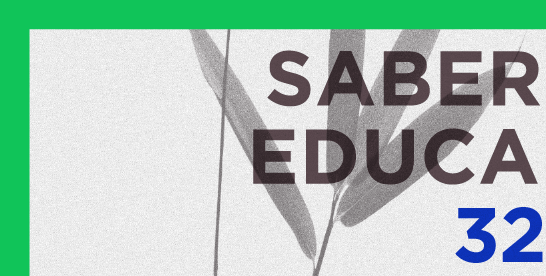Os registos de escrita precoce de crianças de 5-6 anos
evidência da evolução das conceções precoces sobre a linguagem escrita
DOI:
https://doi.org/10.25767/se.v32i2.32815Keywords:
Educação Pré-escolar; Literacia emergente; Registos pedagógicosAbstract
The paper aims to show how the records (Ostetto, 2017) concerning emerging literacy practices obtained in the context of supervised teaching practice, with children aged 5-6 years, allowed to collect evidence about the different stages in which children were, in terms of early conceptions about written language. Based on a sample of eight children aged five and six year-old, an interview guide was selected to evaluate early conceptions about written language, from which records of children’s written productions were collected, as well as a survey about the functionalities they attributed to reading and written language. The analysis of the collected data showed that the records of written productions were decisive to the categorization of children's conceptualizations about written language providing an opportunity for the trainee teacher to appropriate some aspects of emerging literacy, a particularly relevant dimension in terms of professional teacher training in Early Childhood Education (Gimeno, 1988).
References
Albuquerque, A. & Martins, M. A. (2018). Escrita inventada no jardim-de-infância: Contributos para a aprendizagem da leitura e escrita. Análise Psicológica, 3 (XXXVI), 341-354. doi: 10.14417/ap.1308
Ceron, L. & Junqueira, F. (2007). Registro e documentação pedagógica na educação infantil. In S. Albuquerque, J. Felipe, & L. V. Corso, L (Org.), Para pensar a educação infantil em tempos de retrocessos: lutamos pela educação infantil (pp. 188-202). Evangrafm.
Downing, J. (1987). A influência da Escola na Aprendizagem da Leitura. In E. Ferreiro, & M. Palácio (Eds.), Os processos de Leitura e Escrita. Artes Médicas, 182-194.
Edwards, C., Gandini, L. & Forman, G. (1999). As Cem Linguagens da Criança: a abordagem de Reggio Emilia na educação da primeira infância. Artmed.
Fernandes, C. (2018). A descoberta da escrita no Pré-Escolar: O papel do educador como impulsionador da aprendizagem. Tese de mestrado, ISPA. https://repositorio.ispa.pt/bitstream/10400.12/6710/1/25007.pdf
Ferreiro, E. & Palácio, M. (1988). Lire-Ecrire à l’ école: Comment s’y apprennent-ils? Analyse des perturbations dans les processus d’ apprentissage de la lecture et de l’ écriture. CRDP.
Ferreiro, E. & Teberosky, A. (1980). Los sistemas de escritura en el desarrollo del niño. Siglo Vintiuno Editores.
Ferreiro, E. & Teberosky, A. (1986). Psicogênese da Língua Escrita. Artes Médicas.
Fijalkow, E. (1989). Le langage technique de la lecture-écriture. In Actes du Colloque International Premier Contact avec l´Écriture et la Lecture (pp. 21-31). Helidoni.
Fijalkow, E. (1993). Clarté Cognitive en Grande Section de Maternelle et Lecture au Cours Préparatoire. In G. Chaveau, M. Rémond, & E. Rogovas-Chauveau (Eds.), L’ Enfant Apprenti Lecteur: L’ Entrée dans le Système Écrit. Collection CRESAS (10), INRP-L’Harmattan, 83-104.
Gimeno, J. (1998). El Currículum: una refléxion sobre la práctica. Morata.
Goodman, Y. (1984). The development of initial literacy. In H. Goelman, A. Olberg, & F. Smith (Eds.), Awakening to Literacy. Heinemann Educational, 316-324.
Horta, M. H. (2015). A abordagem à linguagem escrita na etapa final da educação pré-escolar: estudo de casos múltiplos na região do sotavento algarvio. Universidad de Huelva.
Justice, L. & Kaderavek, J. (2002). Using shared storybook reading to promote emergent literacy. Teaching Exceptional Children, 34(4), 8-13.
Martins, M.A. (1996). Pré-História da Aprendizagem da Leitura. ISPA.
Martins, M.A. & Niza, I. (1998). Psicologia da Aprendizagem da Linguagem Escrita. Universidade Aberta.
Mata, L. (2008). A descoberta da escrita: Texto de apoio para educadores de infância, Ministério da Educação, Direção Geral de Inovação e Desenvolvimento Curricular.
Sá-Chaves, I. (2004). Portfolios Reflexivos: estratégias de formação e de supervisão. Universidade de Aveiro.
Silva, I. L. (Coord.) et al. (2016). Orientações Curriculares para a Educação Pré-Escolar, Ministério da Educação, Direção-Geral da Educação.
Teale, W. & Sulzby, E. (1989). Emergent Literacy: New Perspectives. In D. S. Strickland, D. S. & L. M. Morrow, (Eds.), Emerging Literacy: Young Children Learn To Read and Write. International Reading Association,13-27.
Viana, F. L. (2001). Melhor falar para melhor ler – Um programa de desenvolvimento de competências linguísticas (4-6 anos). Centro de Estudos da Criança - Universidade do Minho.
Vigotsky, L. S. (1977). Aprendizagem e Desenvolvimento Intelectual na Idade Escolar. In L. Luria, L. S. Vygotsky, L. S. (et al.), Psicologia e Pedagogia I: Bases psicológicas da aprendizagem e do desenvolvimento. Ed. Estampa.
Zabalza, M. (1994). Diários de Aula: um instrumento de pesquisa e desenvolvimento profissional. Artmed.
Downloads
Published
How to Cite
Issue
Section
License
Copyright (c) 2023 Maria Cristina Vieira da Silva, Joana Daniela Leão Moreira

This work is licensed under a Creative Commons Attribution-NonCommercial-ShareAlike 4.0 International License.
- The opinions expressed by the authors are their exclusive responsibility.
- The journal reserves the right to make the original, normative changes, spelling and grammar, in order to maintain the standard language of worship, while respecting the style of the authors.
- Authors retain copyright and grant the journal right of first publication with the work simultaneously licensed under a Creative Commons Attribution License (BY-NC-SA 4.0) that allows others to share the work with an acknowledgement of the work's authorship and initial publication in this journal.
- Authors are able to enter into separate, additional contractual arrangements for the non-exclusive distribution of the journal's published version of the work (e.g., post it to an institutional repository or publish it in a book), with an acknowledgement of its initial publication in this journal.
- Authors are permitted and encouraged to post their work online (e.g., in institutional repositories or on their website) prior to and during the submission process, as it can lead to productive exchanges, as well as earlier and greater citation of published work (See The Effect of Open Access).
PRIVACY STATEMENT
The names and email addresses entered in this journal site will be used exclusively for the stated purposes of this journal and will not be made available for any other purpose or to any other party.






